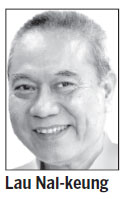Gutter oil patriotism
Updated: 2012-09-25 06:59
By Lau Nai-keung(HK Edition)
|
|||||||||

The Diaoyu Islands dispute between China and Japan has intensified, as Japan expresses the intent to nationalize the island and its affiliated territories. Rallies and protests broke out in many regions of China, with a rising anti-Japanese sentiment across the country. Meanwhile, the sales of Japanese cars in China have experienced a dramatic decline as the situation worsens.
Demonstrations led to activities commonly known in the mainland as "hitting, smashing and robbing" (HSR) combo. Anything associated with Japan in the mainland, be it a car, a fashion outlet or a restaurant, is liable to be destroyed and burned, although their Chinese owners paid for or invested in such assets with hard-earned money. This extreme form of patriotism is manifested in cases where mainlanders burned their own Japanese vehicles.
Most people in Hong Kong would of course consider these people irrational. Indeed, not an insignificant number of people on the mainland think that all this passion is uncalled for. "Although the patriots are eating unsafe food cooked with gutter oil, they share the concerns of the national leaders," those who question this outburst of patriotism taunted.
It is common for people who are unsympathetic to Chinese nationalism to write off these attitudes as the results of State propaganda. A more sophisticated form of such disparagement blames a collective sub-conscious. "These expressions of outrage were rooted in the perception that China was victimized by a foreign country," a Wall Street Journal article once remarked on Chinese nationalism in general. "This idea of a wounded, defeated nation has deep roots in education and propaganda."
In "China's New Nationalism", Peter Gries discusses how the narrative of China's "century of humiliation" has framed its interactions with the West. This narrative starts, he says, with China's defeat in the First Opium War and the British acquisition of Hong Kong in 1842, and includes unequal treaties with the British and the Japanese in the 19th century, and continues with the War of Resistance against Japan in the 1930s and 1940s.
By this logic, it is simply "not cool" for victims to have a history, as their history would necessarily be nothing but "a narrative of victimization and humiliation". Clearly, it is not a coincidence that Hong Kong, the coolest place in China, is also the first to remove history from the core curriculum.
With words such as colony, colonial and colonialism all conspicuously absent from mainstream discourse in Hong Kong, it is not difficult to understand why a lot of people, especially our youngsters, have a twisted understanding, both of the past and (therefore) the present of the place they now call "indigenous".
But of course, senseless is the norm in Hong Kong, where we have completely forgotten that we were invaded by the Japanese in the same war as well. Nobody here talks about "three years and eight months", the metonym of the Japanese occupation of Hong Kong anymore, as those who fought the Japanese were mainly the "evil Communists" in the guise of the East River Column.
Our status as a colony then also determined our reaction to the war and our collective recollection of it. During the 1930s, the British colonial government obstructed China's fight to preserve territorial integrity against Japanese occupation of Manchuria, for fear of antagonizing a rising Japan and on the principle that foreign occupation of semi-colonial China was the international norm. The South China Morning Post, then British-owned, did not depict Japan as the aggressor in China until very late, lest such a depiction reflect on British occupation of Hong Kong itself as aggression.
What these "civilized" and "rational" Westerners and Hong Kong bananas' demand is nothing less than ultimate submission. By discounting complaints of unjust treatment to mere discourse, the victim must live as if he is not (and has never been) humiliated to qualify as a "world citizen". "Be confident," they say. "You are rich now."
People in the mainland, particularly those from localities where cruelty was inflicted directly by the Japanese army, remember their histories. Those who think that a gutter oil scandal should have distracted the Chinese people from remembering a killed grandfather or a raped great-aunt are simply senseless.
A universal norm does not exist. There is only the norm of the aggressor, and the norm of the aggressed. The question is where we stand.
The author is a member of the Commission on Strategic Development.
(HK Edition 09/25/2012 page4)